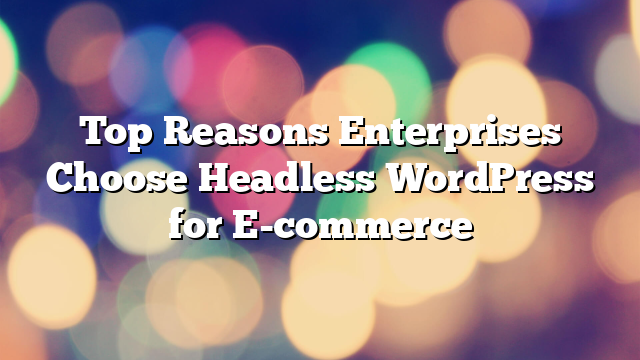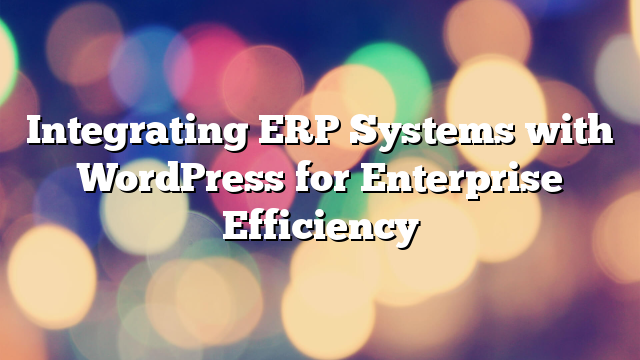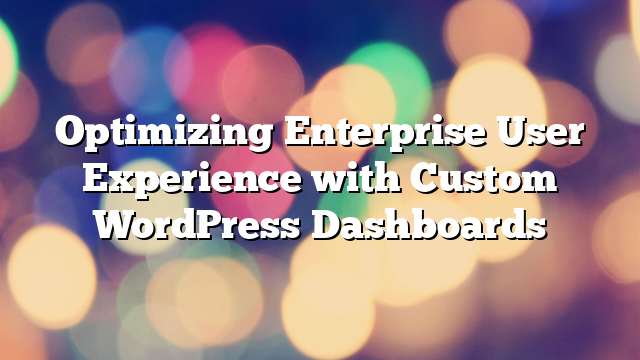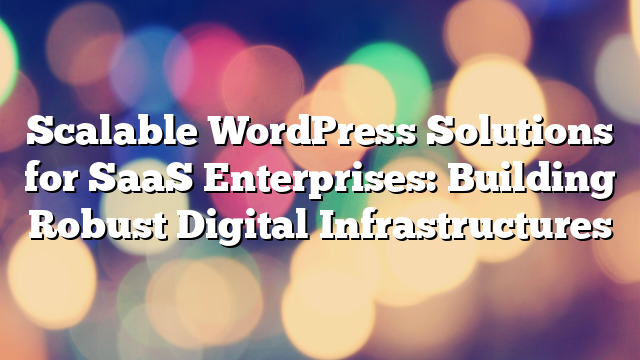Top Reasons Enterprises Choose Headless WordPress for E-commerce
20.11.2024

Top Reasons Enterprises Choose Headless WordPress for E-commerce
The e-commerce industry demands fast, flexible, and scalable solutions to meet ever-growing customer expectations. While traditional WordPress is a trusted platform for building websites, enterprises increasingly turn to Headless WordPress to power their online stores. By decoupling the back-end from the front-end, Headless WordPress delivers exceptional performance and customization options, making it an ideal choice for enterprise e-commerce operations. In this article, we’ll explore the key reasons why Headless WordPress is revolutionizing e-commerce for large-scale businesses.
What is Headless WordPress?
Headless WordPress separates the content management back-end from the front-end presentation layer. With this architecture, WordPress handles content storage and management, while the front-end is built using modern frameworks like React, Next.js, or Vue.js. The two communicate via APIs, enabling unparalleled flexibility and performance.
Why Enterprises Choose Headless WordPress for E-commerce
1. Lightning-Fast Website Performance
Speed is critical in e-commerce. Studies show that even a one-second delay in page loading can significantly impact conversion rates. Headless WordPress allows developers to use optimized front-end technologies like Next.js for static site generation (SSG) or server-side rendering (SSR). This results in fast-loading pages, even under high traffic conditions, ensuring a seamless shopping experience for users.
2. Customization Without Limits
Traditional WordPress themes often come with limitations that can stifle creativity and functionality. Headless WordPress removes these constraints, giving enterprises the freedom to design unique, fully customized user experiences. From personalized product recommendations to advanced search features, businesses can build e-commerce platforms tailored to their brand and audience.
3. Omnichannel Content Delivery
Modern consumers interact with brands across various channels, including mobile apps, social media, and IoT devices. Headless WordPress supports omnichannel strategies by delivering content through APIs to multiple platforms. Enterprises can maintain a consistent shopping experience, whether customers are browsing on a desktop, smartphone, or voice assistant.
4. Enhanced Security
Security is a top priority for e-commerce enterprises. Headless WordPress adds an extra layer of protection by isolating the front-end from the back-end. With fewer direct connections between the user interface and the database, the risk of vulnerabilities decreases. Additionally, APIs can be secured with tokens and encryption, ensuring safe data transmission.
5. Scalability for Peak Traffic
E-commerce enterprises must be prepared to handle traffic surges, especially during sales events or holiday seasons. Headless WordPress makes it easier to scale infrastructure by leveraging content delivery networks (CDNs) and caching strategies. Pre-rendered pages can be served quickly to thousands of users simultaneously without straining the back-end.
6. Seamless Integration with Third-Party Tools
E-commerce platforms often rely on a range of third-party tools, such as payment gateways, CRM systems, and analytics software. Headless WordPress integrates seamlessly with these tools through APIs, enabling enterprises to create a cohesive ecosystem. This flexibility supports advanced functionalities like real-time inventory updates and personalized marketing campaigns.
7. Future-Proof Architecture
As technology evolves, enterprises need an e-commerce platform that can adapt. Headless WordPress provides a future-proof solution by separating content management from presentation. Businesses can update or replace their front-end technology without disrupting the back-end, ensuring long-term viability and flexibility.
Challenges of Using Headless WordPress for E-commerce
1. Increased Development Complexity
Building and maintaining a Headless WordPress e-commerce site requires expertise in both WordPress and modern JavaScript frameworks. Enterprises may need to invest in skilled developers or partner with specialized agencies to achieve the desired results.
2. Higher Initial Costs
The setup costs for Headless WordPress are typically higher than traditional WordPress sites. Custom front-end development, API integration, and hosting can increase initial expenses. However, these investments often pay off in the form of improved performance and long-term scalability.
3. API Dependency
Headless WordPress relies heavily on APIs to connect the back-end and front-end. Any performance issues or outages in the API can disrupt the user experience. Enterprises must implement robust monitoring and failover strategies to mitigate this risk.
Best Practices for Implementing Headless WordPress in E-commerce
1. Leverage CDNs for Faster Delivery
Content Delivery Networks (CDNs) are essential for delivering static assets quickly to users worldwide. Enterprises should configure their e-commerce sites to utilize CDNs effectively, reducing latency and ensuring consistent performance.
2. Optimize API Performance
Efficient APIs are crucial for a seamless shopping experience. Enterprises should minimize API calls, use caching strategies, and consider adopting GraphQL for faster, more flexible data retrieval.
3. Prioritize Mobile Optimization
With mobile commerce on the rise, optimizing the mobile shopping experience is essential. Enterprises should use responsive design principles and consider progressive web apps (PWAs) to enhance usability and speed on mobile devices.
4. Implement Advanced Security Measures
To protect sensitive customer data, enterprises should secure their API endpoints, use HTTPS for all communications, and implement multi-factor authentication for administrative access.
Conclusion
Headless WordPress is transforming e-commerce for enterprises, offering unparalleled performance, flexibility, and scalability. By decoupling the front-end and back-end, businesses can create tailored shopping experiences, handle high traffic with ease, and future-proof their online stores. While the initial investment and complexity may be higher, the long-term benefits make Headless WordPress a worthwhile choice for ambitious e-commerce enterprises.
Ready to revolutionize your e-commerce platform? Contact AllWebDev today to explore how Headless WordPress can drive your enterprise success.



